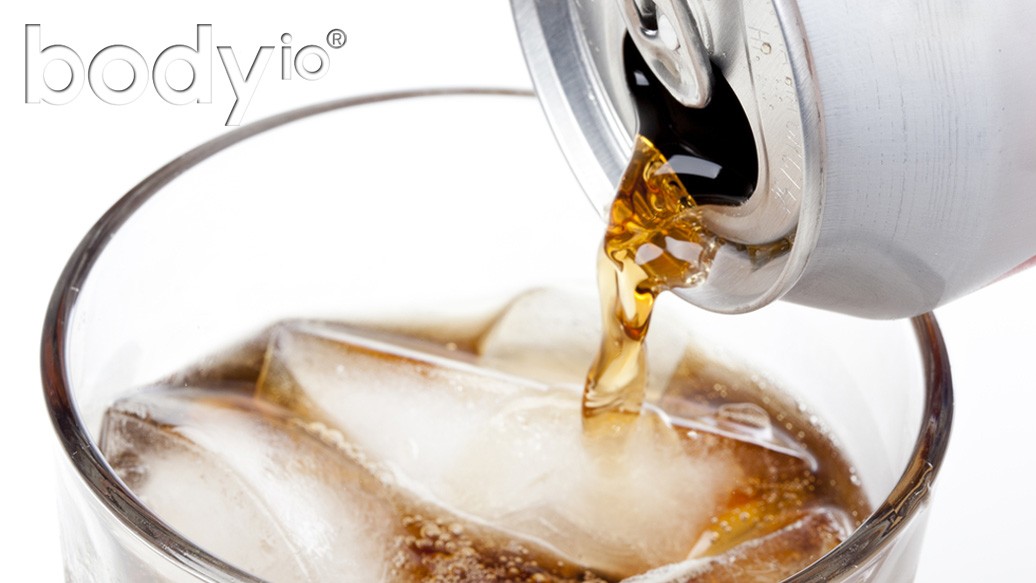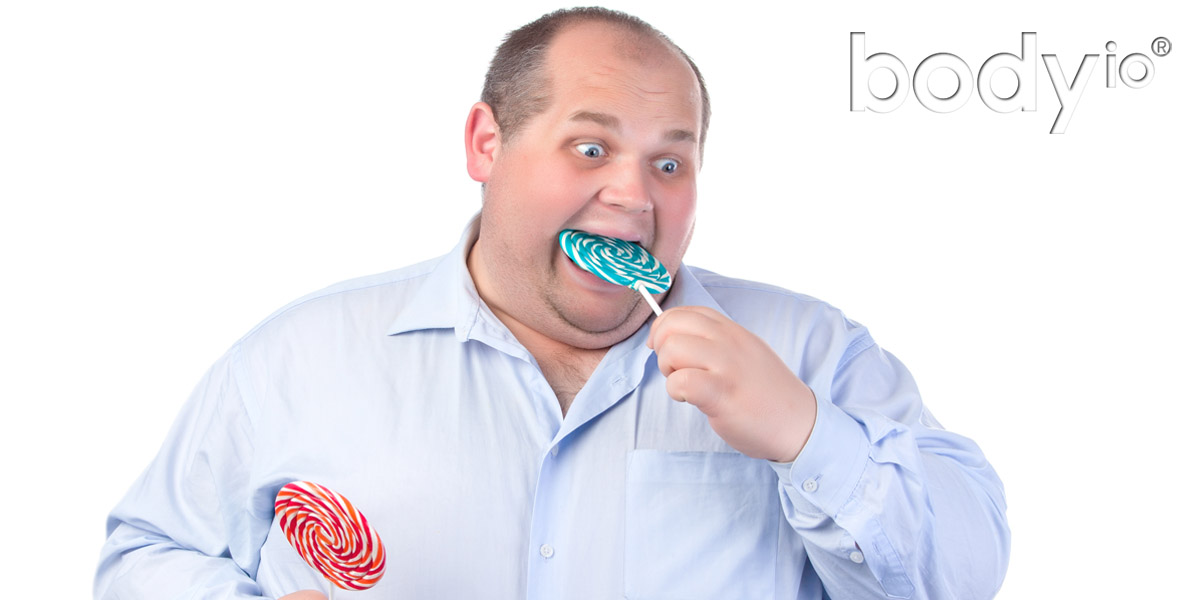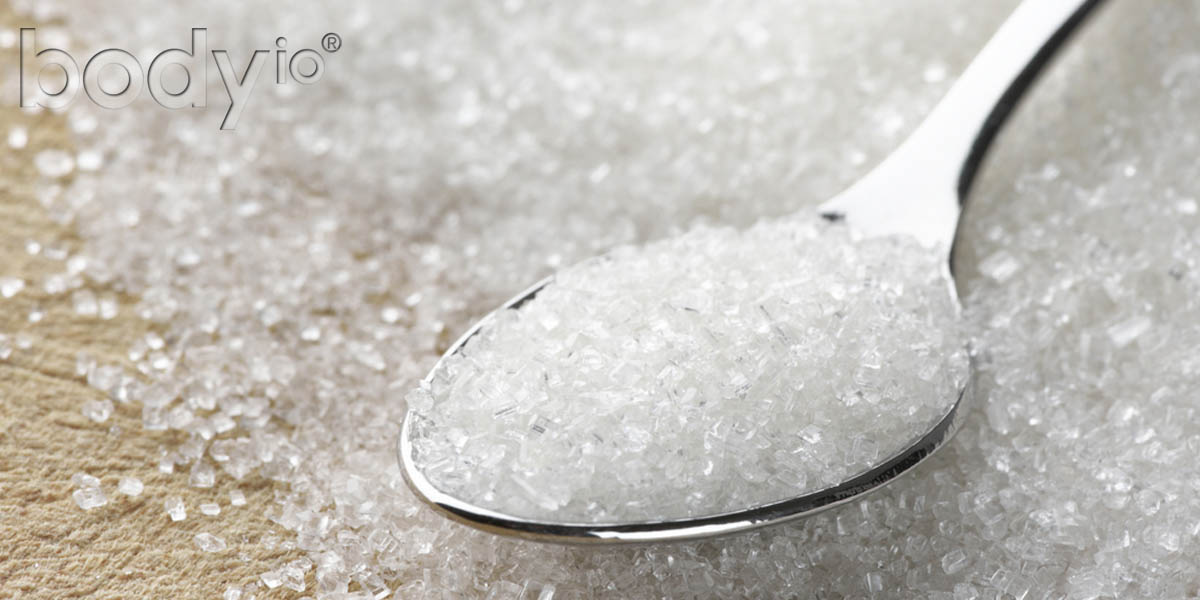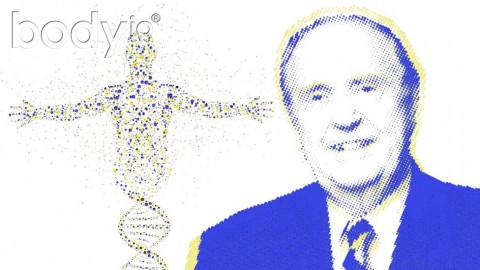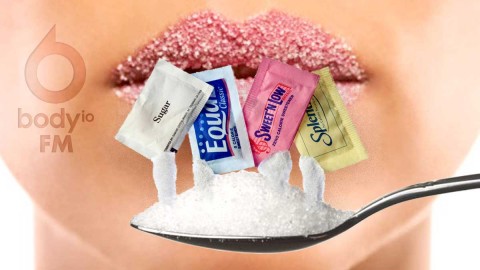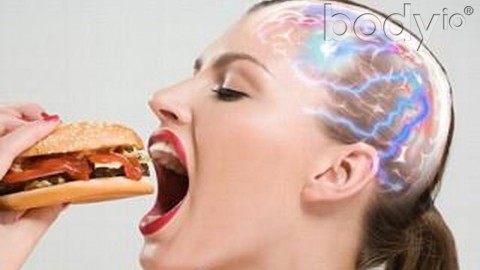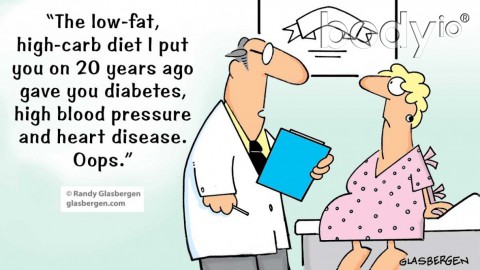Artificial sweeteners might be making us fatter and sicker than we’re already making ourselves with carbs alone. This is what a research article recently published in Diabetes Care, the American Diabetes Association’s journal, is telling us, and it’s stirred up a serious maelstrom across the Twittersphere.
This isn’t anything new for me—nor is it particularly problematic—because I’ve said time and again that if you’re liberally consuming diet drinks and having trouble making progress on an ultra-low carb diet, then the sweeteners in the drinks may be a culprit. There’s research to show that this is possible. This study does, however, raise issues for certain people who’ve spent six pages on their websites trying to demonstrate that my statement should be ignored.
The lesson here? Never speak in absolutes about how the substances we ingest affect the body. Ultimately, you’ll be proven wrong—hence the classic Kiefer “It depends” response to so many questions.
This particular study showed an increased insulin response as a consequence of pre-ingesting sucralose, the artificial sweetener in Splenda®, followed by a bolus ingestion of real sugar. I’m not going to talk about sucralose’s safety, however, nor do I want to address the fact that it’s completely unmetabolised in the human body. Instead, I want to talk specifically about this study[1]—the abstract of which can be found here (you’ll have to purchase the study if you want to read the whole thing).
The study shows that just the oral stimulation of “sweetness,” by way of the intense sweetener sucralose, caused an increase in the release of insulin, and poor blood sugar control. This, supposedly, is irrefutable proof that non-nutritive sweeteners (NNS) make us fat.
Herein lies a demonstration of the internet’s cumulative ignorance about the body—and the way it gives advice and causes angst based on an isolated study that reporters only read in a vacuum, ignoring the volumes of research that preceded it. Ignorance allows us to draw conclusions that are wrong and even deceptive—perhaps purposefully so.
The key feature of this research paper actually has nothing to do with the NNS sucralose, and it’s a confirmation of Pavlovian conditioning. What nobody mentions is that the subjects of this study were grossly obese, with BMIs over 40. I realize that BMI sucks as a statistic, but it becomes more accurate at predicting body fat composition as the number gets higher, so we can assume the subjects were rather portly in this instance. You can’t assess this study—especially the abstract—without focusing on this fact. A corollary fact to all of this is that obese bodies don’t respond the same way healthy ones do.
Sweetness, as far as how the body detects it and reacts to it, is a complex subject that we’re only just beginning to understand[2]. One of the key discoveries that questions our assumption that NNSs can’t make us fat or affect hormone function is the revelation that mammals—including humans—possess receptors for sweetness throughout key parts of our digestive tract[3-5]. Your body can determine if something’s sweet in your gut the same way it can for your mouth. It’s possible, then, that eating something sweet—even if it has zero caloric value—could cause a hormonal reaction, priming the body to get fat.
To fairly evaluate the results of this study, minus the resultant hysteria, we need to see if ingesting the same sweetener by itself can cause a reaction in people at healthy weights, and not just the obese. A study that’s not much older (published in 2011) found that healthy people, upon ingesting sucralose, showed absolutely no hormonal reaction to the substance[6]. I suspect this article didn’t receive the same attention because it doesn’t facilitate sensational headlines like “Coke Zero Makes You Fat.”
The problem here? Two studies with contradictory results. Is that really what we’re seeing, though? Like I said, the key feature to the most recent study is that the patients were extremely obese. To me, it seems likely that there must be another explanation, i.e., maybe the gut doesn’t have anything to do with it in this case. Maybe it’s actually the mind.
I’m not suggesting that sucralose goes straight to the brains of fat people, while healthy people have brains that somehow resist sucralose, or sweetness in general. What I’m saying is that this insulin secretion is a conditioned response. Just like it happened with Pavlov’s dogs, the smell or taste of something sweet becomes a bell, that when rung, triggers a physical response. In the case of the dogs, they salivated. In the case of obese humans, it’s possible that their bodies start producing insulin and other hormones in anticipation of eating.
This is exactly what happens. Normally, when we smell or taste food, we’re going to eat it. This teaches the body that we’re going to be digesting food very soon when we smell or taste something. The body is an anticipatory machine that learns to react prior to an activity in order to better prepare for it. This holds true for eating. If you smell, taste, or even think about eating, you could trigger an insulin response before the food even hits your stomach.
I stress ‘could’ here because this isn’t the case in lean, healthy humans. In some cases[7-9], these people don’t reliably secrete insulin to the sight, smell, or even taste of food. Overweight and obese people react differently. This effect seems to result primarily from an anticipated response, along with some degree of insulin resistance[10-12]. The response is greater with greater amounts of body fat[12], and can lead to problems like difficulties in clearing blood sugar (exactly what the study in question confirms).
This conditioning could be stronger in obese people for the same reason that they have extra body fat in the first place: They’re more likely to indulge in carb-heavy foods more often, and to a greater extent. The body is wise to start its metabolisation engine (insulin secretion) early if it’s getting big loads of carbohydrates on a regular basis. We can also see that this may be a result of conditioning, because even the smell of food can cause insulin levels to rise in obese people[13]. There’s even evidence that the brain acts differently during smell and taste in overweight individuals, with a greater craving response that gets stronger as the amount of body fat increases[14].
Maybe you’re thinking my assumption is wrong, and this works the other way around—that people gain extra body fat because they have this overzealous, hardwired tendency to secrete more insulin than people who are lean. You’d be justified in thinking this, which leads to an important question: Can we force the body of a healthy, lean person who doesn’t possess this pre-eating insulin response to learn it?
Yes, we can. Scientists can successfully cause an insulin response to the smell and taste of food simply by conditioning people the same way Pavlov did with his salivating dogs[15]. It appears that this really is a case of classical Pavlovian conditioning.
You can also see this effect in the tease-and-feed scenario. If you tease people with savory or sweet foods before allowing them to eat, you can stimulate a pre-eating insulin response. It’s important to note here that this requires the teasing to make it effective[7], and can’t be accomplished with just sweet taste alone. In a real way, the anticipation of pleasure gives a stronger response to the stimulus—a common theme with human activities.
A handful of studies exist showing an insulin response from just sweet taste in healthy people, and some studies show a lot of variation in obese subjects, as well. An extensive review from the British Journal of Nutrition, however, found that artificial sweeteners alone do not cause an insulin response during normal consumption[16]. This, of course, ignores the possibility of a Pavlovian, or trained, reflex in the process.
The Pavlovian conditioning hypothesis reliably explains all of this, including discrepancies. Everyone has different cues that make them feel hungry or anticipate eating. A person may currently be healthy, but they could have trained themselves to respond this way at other points in their lives. I’m an example of this. Although I’m healthy and lean now, I was a fat kid. I would bet that I have a pre-eating insulin response depending on the food I smell or taste—or even see, in the case of cherry turnovers.
This brings us full circle to artificial sweeteners, and sucralose in particular. Does this new study show that sucralose or sweet taste via non-nutritive sweeteners actually causes the release of insulin? The answer appears to be no. We can even explore this further, looking at studies where researchers directly inject artificial sweeteners into the gut, bypassing the oral taste sensation. In this case, no insulin response occurs in healthy people[17].
Going back to my own assessment of the use of artificial sweeteners while on an ultra-low carb diet, everything still falls nicely under the aegis of my “It depends” response. You simply can’t assume that no one will have an insulin response, the same way you can’t say that everyone will. If you notice a problem with zero-calorie sweetened drinks, there’s a good chance, that for you specifically, the drinks can be problematic and cause an insulin response.
The point here is this: The above study, where extremely obese people had a significant response to sucralose ingestion followed by an 80 gram load of glucose, tells us nothing about anyone else. You can actually argue that this study only tells us about the tiny group of people tested in the study. Non-nutritive sweeteners do not make us fat. To run around tweeting, on this basis, that we finally have proof that sucralose makes you fat is nothing short of idiotic.
The most perplexing thing here is that the same people who cling strongly to the notion that energy-in versus energy-out is the sole determinant of whether you’ll be fat or not are the same people latching onto this research claiming that non-nutritive zero-calorie sweeteners make us fat. They’re only driving nails into their own coffin, but that’s the thing: When your only area of expertise is the art of regurgitating what everyone else says, you’re bound to make a fool of yourself over and over again.
[expand title=”References (click to expand)”]
- Pepino MY, Tiemann CD, Patterson BW, Wice BM, Klein S. Sucralose Affects Glycemic and Hormonal Responses to an Oral Glucose Load. Diabetes Care. 2013 Apr 30. [Epub ahead of print]
- Masuda K, Koizumi A, Nakajima K, Tanaka T, Abe K, Misaka T, Ishiguro M. Characterization of the modes of binding between human sweet taste receptor and low-molecular-weight sweet compounds. PLoS One. 2012;7(4):e35380.
- Jang HJ, Kokrashvili Z, Theodorakis MJ, Carlson OD, Kim BJ, Zhou J, Kim HH, Xu X, Chan SL, Juhaszova M, Bernier M, Mosinger B, Margolskee RF, Egan JM. Gut-expressed gustducin and taste receptors regulate secretion of glucagon-like peptide-1. Proc Natl Acad Sci U S A. 2007 Sep 18;104(38):15069-74.
- Margolskee RF, Dyer J, Kokrashvili Z, Salmon KS, Ilegems E, Daly K, Maillet EL, Ninomiya Y, Mosinger B, Shirazi-Beechey SP. T1R3 and gustducin in gut sense sugars to regulate expression of Na+-glucose cotransporter 1. Proc Natl Acad Sci U S A. 2007 Sep 18;104(38):15075-80.
- Mace OJ, Affleck J, Patel N, Kellett GL. Sweet taste receptors in rat small intestine stimulate glucose absorption through apical GLUT2. J Physiol. 2007 Jul 1;582(Pt 1):379-92.
- Ford HE, Peters V, Martin NM, Sleeth ML, Ghatei MA, Frost GS, Bloom SR. Effects of oral ingestion of sucralose on gut hormone response and appetite in healthy normal-weight subjects. Eur J Clin Nutr. 2011 Apr;65(4):508-13.
- Bruce DG, Storlien LH, Furler SM, Chisholm DJ. Cephalic phase metabolic responses in normal weight adults. Metabolism. 1987 Aug;36(8):721-5.
- Abdallah L, Chabert M, Louis-Sylvestre J. Cephalic phase responses to sweet taste. Am J Clin Nutr. 1997 Mar;65(3):737-43.
- Teff KL, Devine J, Engelman K. Sweet taste: effect on cephalic phase insulin release in men. Physiol Behav. 1995 Jun;57(6):1089-95.
- Karhunen LJ, Lappalainen RI, Niskanen LK, Turpeinen AK, Uusitupa MI. Determinants of the cephalic-phase insulin response in obese nondiabetic subjects. Metabolism. 1996 Feb;45(2):168-73.
- Teff KL, Mattes RD, Engelman K, Mattern J. Cephalic-phase insulin in obese and normal-weight men: relation to postprandial insulin. Metabolism. 1993 Dec;42(12):1600-8.
- Simon C, Schlienger JL, Sapin R, Imler M. Cephalic phase insulin secretion in relation to food presentation in normal and overweight subjects. Physiol Behav. 1986;36(3):465-9.
- Osuna JI, Pages I, Motiño MA, Rodriguez E, Osorio C. Cephalic phase of insulin secretion in obese women. Horm Metab Res. 1986 Jul;18(7):473-5.
- DelParigi A, Chen K, Salbe AD, Reiman EM, Tataranni PA. Sensory experience of food and obesity: a positron emission tomography study of the brain regions affected by tasting a liquid meal after a prolonged fast. Neuroimage. 2005 Jan 15;24(2):436-43.
- Stockhorst U, Gritzmann E, Klopp K, Schottenfeld-Naor Y, Hübinger A, Berresheim HW, Steingrüber HJ, Gries FA. Classical conditioning of insulin effects in healthy humans. Psychosom Med. 1999 Jul-Aug;61(4):424-35.
- Renwick AG, Molinary SV. Sweet-taste receptors, low-energy sweeteners, glucose absorption and insulin release. Br J Nutr. 2010 Nov;104(10):1415-20. Review.
- Steinert RE, Frey F, Töpfer A, Drewe J, Beglinger C. Effects of carbohydrate sugars and artificial sweeteners on appetite and the secretion of gastrointestinal satiety peptides. Br J Nutr. 2011 May;105(9):1320-8.
[/expand]




